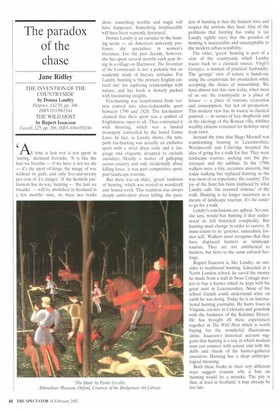The paradox of the chase
Jane Ridley
THE INVENTION OF THE COUNTRYSIDE by Donna Landry Pa/grave, £42.50, pp. 306, ISBN 0333961544 THE WILD HOST by Rupert Isaacson Cassell, £25, pp. 296, ISBN 0304359246 A, time is lost wot is not spent in 'unting,' declared Jorrocks. 'It is like the hair we breathe — if we have it not we die — its the sport of kings, the image of war without its guilt, and only five-and-twenty per cent of it's danger.' If the Scottish parliament has its way, hunting — 'the hair we breathe' — will be abolished in Scotland in a few months' time. As these two books
show, something terrible and tragic will have happened. Something irreplaceable will have been wantonly destroyed.
Donna Landry is an outsider to the hunting scene — an American university professor, she specialises in women's literature. For the past decade, however, she has spent several months each year living in a village on Dartmoor. The Invention of the Countryside is not a polemic but an academic study of literary attitudes. For Landry, hunting is 'the primary English cultural site' for exploring relationships with nature, and her book is densely packed with fascinating insights.
Fox-hunting was transformed from vermin control into ultra-fashionable sport between 1790 and 1820. The fox-hunters claimed that their sport was a symbol of Englishness, open to all. They contrasted it with shooting, which was a landed monopoly controlled by the hated Game Laws. In fact, as Landry shows, the new. posh fox-hunting was actually an exclusive sport with a strict dress code and a language and etiquette designed to exclude outsiders. Mainly a matter of galloping across country and only incidentally about killing foxes, it was part competitive sport, part landscape tourism.
But there was an older, 'green' tradition of hunting, which was rooted in woodcraft and hound work. This tradition was always deeply ambivalent about killing: the para
dox of hunting is that the hunters love and respect the animals they hunt. One of the problems that hunting has today is (as Landry rightly says) that the paradox of hunting is inaccessible and unacceptable to the modern urban sensibility.
The older, 'green' hunting is part of a view of the countryside which Landry traces back to a classical source: Virgil's Georgics, a manual of practical husbandry. The 'georgic' view of nature is hands-on, using the countryside for production while accepting the duties of stewardship. We have almost lost this view today, when most of us see the countryside as a place of leisure — a place of tourism, recreation and consumption, but not of production. This modern view has its source in classical pastoral — in scenes of lazy shepherds and in the ideology of the Roman villa, whither wealthy citizens retreated for holidays away from town.
Around the time that Hugo Meynell was transforming hunting in Leicestershire, Wordsworth and Coleridge invented the idea of going for a walk for fun. They were landscape tourists, seeking out the picturesque and the sublime. In the 1790s walkers were a tiny, eccentric minority, but today walking has replaced hunting as the way most of us experience the country. The joy of the hunt has been displaced by what Landry calls 'the arrested violence' of the walk. Hunting is no longer necessary as a means of landscape tourism. It's far easier to go for a walk.
Landry's conclusions are upbeat. No one, she says, would ban hunting if they understood its full historical complexity. But hunting must change in order to survive. It must return to its 'greener, naturalistic former self. Walkers must recognise that they have displaced hunters as landscape tourists. They are not antithetical to hunters, but heirs to the same cultural heritage.
Rupert Isaacson is, like Landry, an outsider to traditional hunting. Educated at a North London school, he saved the money he made from a stall in Swiss Cottage market to buy a hunter which he kept with his great aunt in Leicestershire. None of his school friends could understand what on earth he was doing. Today he is an international hunting journalist. He hunts foxes in Virginia, coyotes in Colorado and gemsbok with the bushmen of the Kalahari Desert. He has brought all these experiences together in The Wild Host which is worth buying for the wonderful illustrations alone. Isaacson's historical account suggests that hunting is a way in which modern man can connect with nature and with the skills and rituals of his hunter-gatherer ancestors. Hunting has a deep anthropological meaning.
Both these books in their very different ways suggest reasons why a ban on hunting would be a mistake. The pity is that, at least in Scotland, it may already be too late.




































































 Previous page
Previous page